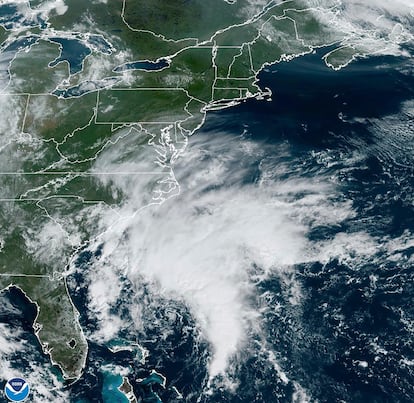Tropical Storm Ophelia forms off the US mid-Atlantic coast, expected to bring heavy rain and wind
Virginia’s governor declared a state of emergency on Friday and the intensifying weather system has forced schools to close early and weekend events to be canceled

Tropical Storm Ophelia has formed off the mid-Atlantic coast and is expected to bring heavy rain, storm surges and windy conditions over the weekend, the National Hurricane Center said. Ophelia had maximum sustained winds of 60 mph (95 kph), according to a 2 p.m. ET advisory from the Miami-based center. The storm was centered 150 miles (240 kilometers) southeast of Cape Fear, North Carolina. It was forecast to make landfall Saturday morning.
Virginia’s governor declared a state of emergency Friday, and the intensifying weather system forced schools to close early and caused weekend events to be canceled.
Rain was already moving inland across North Carolina by midday Friday, with some areas expected to get up to 7 inches (17.7 centimeters) across eastern parts of the state and into southeast Virginia, forecasters said. A storm surge warning was in effect for some areas, with surges between 3 and 5 feet (0.9 to 1.5 meters) forecast for parts of North Carolina, the hurricane center reported.
The system’s center is expected to move inland over eastern North Carolina and southeastern Virginia and near the Chesapeake Bay through Sunday, Mike Brennan, the hurricane center’s director, said in a livestreamed briefing on Friday.
The weather was already affecting water taxis in Maryland’s capital, Annapolis. Scott Bierman, a water taxi driver, said service would shut down at 6 p.m., and the decision had already been made to close Saturday.
“We don’t operate when it’s going to endanger passengers and or damage vessels,” Bierman said.
Virginia Gov. Glenn Youngkin declared a state of emergency Friday afternoon, issuing an executive order intended to ease response and recovery efforts. “As this storm has organized and strengthened, it’s becoming clear based on the latest forecasts that impacts to the commonwealth are likely,” Youngkin said in a statement. “We want to ensure that all communities, particularly those with the greatest anticipated impact, have the resources they need to respond and recover from the effects of this storm.”
The governor encouraged residents to prepare an emergency kit and follow the weather forecast closely.
Schools in coastal areas of North Carolina and Virginia announced plans to dismiss students early Friday and cancel afterschool and weekend activities.
The North Carolina Ferry System announced it was suspending several routes and the State Emergency Response Team planned to move to an enhanced watch Friday to ease coordination of resources, the governor’s office said.
The forecast prompted the cancellation of events across the region, including the Kunta Kinte Heritage Festival, which had been set to return to City Dock in Annapolis on Saturday.
A storm surge warning was in effect from Duck, North Carolina, to Chincoteague, Virginia, including Chesapeake Bay south of Windmill Point, and for the Neuse River, the Pamlico River, and portions of Pamlico Sound.
A storm surge watch also was issued from Surf City in North Carolina to Duck, North Carolina, along with Chesapeake Bay north of Windmill Point to Smith Point, the Tidal Potomac south of Colonial Beach and Albemarle and the remainder of Pamlico Sound.
Meanwhile, Hurricane Nigel was downgraded to a post-tropical cyclone centered about 640 miles (1,030 kilometers) northwest of the Azores with maximum sustained winds of 70 mph (110 kph). There were no associated coastal watches or warnings as the storm moved northeast at 37 mph (59 kph), the hurricane center said in its final update on the system Friday morning.
Sign up for our weekly newsletter to get more English-language news coverage from EL PAÍS USA Edition
Tu suscripción se está usando en otro dispositivo
¿Quieres añadir otro usuario a tu suscripción?
Si continúas leyendo en este dispositivo, no se podrá leer en el otro.
FlechaTu suscripción se está usando en otro dispositivo y solo puedes acceder a EL PAÍS desde un dispositivo a la vez.
Si quieres compartir tu cuenta, cambia tu suscripción a la modalidad Premium, así podrás añadir otro usuario. Cada uno accederá con su propia cuenta de email, lo que os permitirá personalizar vuestra experiencia en EL PAÍS.
¿Tienes una suscripción de empresa? Accede aquí para contratar más cuentas.
En el caso de no saber quién está usando tu cuenta, te recomendamos cambiar tu contraseña aquí.
Si decides continuar compartiendo tu cuenta, este mensaje se mostrará en tu dispositivo y en el de la otra persona que está usando tu cuenta de forma indefinida, afectando a tu experiencia de lectura. Puedes consultar aquí los términos y condiciones de la suscripción digital.








































